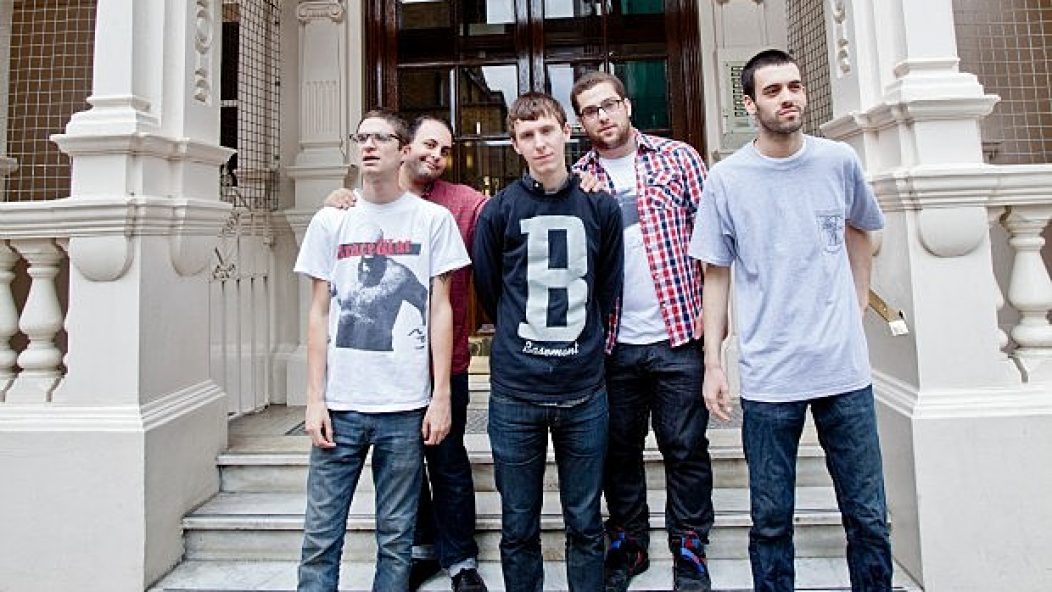
Interview: Man Overboard's Justin Collier on why "Pop Punk's Not Dead"
While it’s true that pop-punk never really died, it’s arguably been years since the scene has been off life support—one may even have to turn the wayback machine to the halcyon days of the late 90s and early 2000s, when seemingly every major label was frantically searching for the next Blink-182 or New Found Glory. Now, with strong independent labels backing the genre and a fresh crop of young bands espousing the pop-punk mantra, it’s an exciting time to be a fan of the music that used to be all about the girls.
Fresh off the release of their new, self-titled album for Rise Records, MAN OVERBOARD guitarist/vocalist Justin Collier chatted with Altpress.com from Ft. Lauderdale, Florida as the band loaded in for another night of the Pop Punk’s Not Dead Tour alongside New Found Glory, Set Your Goals, the Wonder Years and This Time Next Year.
Interview: Bryne Yancey
Man Overboard has been on the Pop Punk’s Not Dead Tour for a few days now. How has the audience response been thus far?
It’s been great. Last night [in Orlando] was awesome; I think tonight is the eighth or ninth show but it’s definitely been pretty crazy so far. It’s the biggest tour we’ve ever done, and it’s with a great group of bands. Since we fly the pop-punk flag pretty high it’s a good tour for us to be on, being the Pop Punk’s Not Dead Tour. But I mean, we’ve only been playing a couple of new songs along with a bunch of old stuff, and it seems like a lot of kids know the new songs, so we’re pretty stoked.
That has to be encouraging, since Man Overboard just came out on September 27.
Yeah, it’s only been out a couple weeks, so it’s cool that when we play some of the new songs—for example, we play “Dead End Dreams” every night and we’ve been switching out the other new song that we play [“Something’s Weird” was the other new song the band performed in Orlando.–ed.]—it’s cool that people know it and picked up the record and are paying attention to it, so we’re pretty excited about that.
What do you think are the advantages of being on a tour like Pop Punk’s Not Dead as one of the opening acts? What are the disadvantages?
Well, we get to go out there every night for a couple hundred, or a lot of nights over a thousand kids, at least half of which have never even heard us. Then there’s kids that come to the show because they like the Wonder Years and have heard of Man Overboard, but they don’t really know us, so you kind of get the chance to cement yourself into those kids’ minds and introduce yourself to a whole new audience.
The downsides are we only get to play for 25 minutes and sometimes it’s pretty early; I think tonight we play at 6:30, so some people don’t show up until after we’ve finished. But at the end of the day, it’s still an amazing tour for us to be on and we’ve had an awesome show every night thus far, so we can’t really complain.
It seems like there’s definitely a revival of sorts in the pop-punk scene, and a huge sense of community fostered both among the fans of the music and the bands playing the music. Would you agree with that?
Yeah, I think there’s always been an audience for pop-punk, there just wasn’t always a big stock of bands that were doing it, or doing it right or for the right reasons. I think in the last couple of years, Run For Cover Records, No Sleep Records, and some of the bigger labels like Hopeless, Rise and Epitaph started signing these bands and started building this community of bands that are not necessarily pop-punk, but that are still within that world: bands like Man Overboard, the Wonder Years, This Time Next Year, Set Your Goals, Balance and Composure, and Transit. These bands all play together and have similar fans and stuff. It’s great that everyone plays together, supports each other and has a good time, so there’s a really neat revival of bands within the punk scene that get to feed the kids that want to hear it.
Speaking of labels, how has the experience with Rise Records been so far? What do you think about the evolution of that label, and how unexpectedly diverse its roster has become?
When that label started in the 90s, Craig [Ericson, founder of Rise] just released a bunch of records by straight edge bands from northern California, then he stopped doing the label for a couple of years, came back and started signing metal bands. Up until recently, Rise was known as a metal, “crabcore” label, which is kind of what we thought it was when we first started talking to them. I think they got pigeonholed into being that kind of label for a minute because when he brought it back, that’s what Craig was signing and that’s what was doing well, and now that Rise is established, he probably went, “Well, I’m not gonna do metal for the rest of my life. I’m gonna try some different shit.” We were the first non-metal band on the label, and then he signed Transit, Sharks, and Hot Water Music, plus he reissued Piebald’s early discography. He also recently signed Daytrader and Cheap Girls, and now the roster is really diverse. It’s neat to be a part of it. alt








